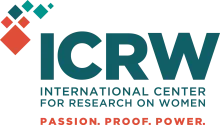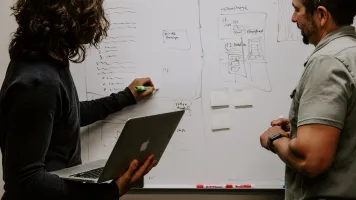International Center for Research on Women (ICRW) was founded in 1976 in response to concerns that international development interventions were benefiting men and women unequally – to the detriment of entire societies. At the time, women’s roles and responsibilities, their needs and concerns, and their contributions and constraints were invisible to those who determined how countries spent funds to combat poverty, illiteracy, and poor health. ICRW was established to make visible the invisible.
In its early years, ICRW quantified how women contributed to the economy through diverse occupations and showed that a growing number of poor households depended on income from women’s labor. Our findings determined that the effectiveness of poverty relief programs were undermined by a misperception that households were led only by men. By not recognizing women as heads of households, programs failed to reach the most vulnerable among the poor. Even more, these poverty-alleviation programs did not capitalize on another well-documented reality – that when women control resources, their children are more likely to be educated and healthier.
Over time, our research and advocacy efforts have helped change the trajectory of women’s lives in developing countries. For instance, in the 1980s, ICRW’s research in Latin America demonstrated that if credit programs were designed to meet poor women’s needs for smaller loans and untraditional forms of collateral, women paid the loans back at rates often better than men. Today, millions of poor women worldwide benefit from microfinance programs.
ICRW also is responsible for uncovering issues that affect the health of the world’s women. In the 1990s, we were among the first organizations to document the impact of AIDS on women. ICRW discovered that women in long-term relationships were becoming infected with the disease because they did not have access to information about how to protect themselves from it. We also found that their economic dependency on men made it less likely for women to have the power to convince their partner to use a condom – especially when the consequence of doing so can be violence against them.
In 2016, ICRW merged with Re:Gender (formerly the National Council for Research on Women). Both organizations value the power of research in crafting policy and designing services that not only serve the needs of women and girls but strive to transform their social status and economic well-being. ICRW and Re:Gender are venerable research organizations that have been engaged for decades in advocating for women’s rights and human rights.
Today, ICRW’s research, advocacy, services to and partnerships with other groups continue – all with an eye to reduce global poverty by investing in the lives of women and girls.
Priorities as a partner of the Global Partnership for Sustainable Development Data
ICRW supports data collection and analysis on a variety of gender equality issues. We have established prowess as a research organization dedicated to collecting and analyzing qualitative and quantitative data on gender inequality, health, poverty, livelihoods, time use, and addressing key topics such as stigma, social inclusion, and ending child marriage.
We work actively on development commitments to gender equality and financing for gender equality and have an ongoing campaign to support gender mainstreaming and citizen oversight of the SDG process.


